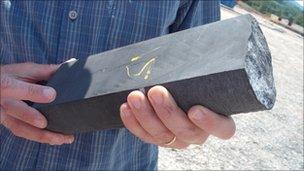Shale gas 'worse than coal' for climate
- Published

The new kid on the energy block, shale gas, may be worse in climate change terms than coal, a study concludes.
Drawn from rock through a controversial "fracking" process, some hail the gas as a "stepping stone" to a low-carbon future and a route to energy security.
But US researchers found that shale gas wells leak substantial amounts of methane, a potent greenhouse gas.
This makes its climate impact worse than conventional gas, they say - and probably worse than coal as well.
"Compared to coal, the footprint of shale gas is at least 20% greater and perhaps more than twice as great on the 20-year horizon, and is comparable over 100 years," they write in a paper to be published shortly in the journal Climatic Change.
"We have produced the first comprehensive analysis of the greenhouse gas footprint of shale gas," said lead author Robert Howarth from Cornell University in Ithaca, US.
"We have used the best available data [and] the conclusion is that shale gas may indeed be quite damaging to global warming, quite likely as bad or worse than coal," he told BBC News.
Short-term fix?
Greenhouse gas emissions from shale gas are predominantly down to two things: carbon dioxide produced when the gas is burned, and methane that leaks out while the well is being exploited.
Figures from the US government and industry indicate that at least a third more methane leaks from shale gas extraction than from conventional wells - and perhaps more than twice as much.
Extracting the gas involves a complex sequence of processes including drilling down and then sideways along a shale bed, cracking the rock with hydraulic pressure or explosions (fracking), placing plugs in the shaft and then "drilling out" these plugs.
Coal, by contrast, is associated with a much smaller methane release during mining; but burning it produces about twice as much CO2 as burning natural gas.
Molecule for molecule, methane is a much more potent greenhouse gas than CO2; but it lasts for a much shorter time in the atmosphere.
Figures from this research team indicate that over a 20-year period, the net warming impact of using shale gas is worse than coal - and, perhaps more surprisingly, that conventional gas may be worse than coal as well.
Over a 100-year timeframe, conventional gas is almost certainly better than coal - but shale gas could be worse.
The precise numbers depend most on leakage rates. Dr Howarth's group used "best practice" estimates; in the real world, therefore, the leakage and the climate impact could be even worse.
"No-one knows for sure to what extent industry uses best practices; and unfortunately, at least in the US, industry does not want government or the public to know," he said.
"The Environmental Protection Agency has proposed rules that would require industry to report methane emissions, but several companies have sued the EPA to try to prevent such reporting."
With greenhouse gas emissions resuming their rise as societies emerge from recession, and with growth in fossil fuel use expanding at a faster absolute rate than renewables, some analysts and even climate campaigners have seized on the option of expanding gas use as a "transitional fuel" on the way from high-carbon coal-burning to low-carbon alternatives.
The new US analysis suggests this may not be a sensible strategy, given that the total carbon footprint appears bigger - especially if the gas comes from shale formations.
Current projections suggest that within 25 years, half of the US natural gas output will come from shale, while many other countries are also pursuing the technology.
The first trial fracking in the UK took place last month, in Lancashire.
Euan Nisbet, a geologist who runs several methane monitoring and research programmes from Royal Holloway, University of London, suggested the detailed balance might vary between geological formations.
"By trying to evaluate the greenhouse gas footprint of shale gas extraction, Howarth and his team are asking important questions about this new bonanza," he said.
"I suspect the debate on this will be long, and the answers will be different for each shale gas formation; but it is important that we tackle this debate."
"We also need to be very careful to account fully for the greenhouse footprint of conventional gas piped over long distances, for instance in the import of Asian gas to Europe, or Norwegian gas to the UK. The energy choices are not easy."
The UK Department for Energy and Climate Change (DECC) is preparing to issue more fracking licences around the country, and a spokesman said it would "closely monitor developments and consider the need for additional research to improve our understanding of the implications for policy".
Robert Howarth, however, was less equivocal.
"We should not proceed to view shale gas as a 'transitional fuel' to be used over the next few decades to replace other fossil fuels, but rather work harder to move towards truly green renewable fuels as quickly as possible, such as wind and solar."
- Published1 April 2011
- Published8 March 2011
- Published20 January 2011
- Published21 December 2010